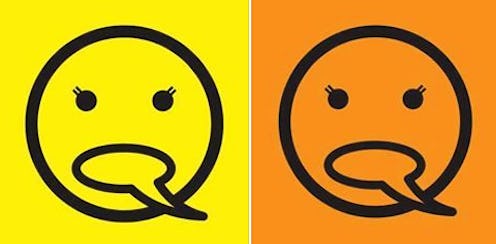
Wondering what those orange and yellow faces showing up on Facebook profile pictures mean? They're actually part of a sexual assault awareness movement that originated in Iceland on the Facebook group Beauty Tips (because, surprise surprise, people can care about both beauty and sexual assault prevention). When one user asked if anyone else in the group had been sexually assaulted, hundreds of women responded in the affirmative. Feeling like this shouldn't have been as surprising as it was, many of these women decided to share their stories of assault and harassment publicly on Facebook and Twitter with the hashtags #þöggun ("silencing"), #konurtala ("women speak"), and #outloud.
In addition, participants in the movement are changing their Facebook profile pictures to orange faces with speech bubbles as mouths to indicate that they have been victims of sexual violence and yellow ones to demonstrate that they know victims. Users of the profile picture and hashtags have been copying and pasting this status, which points out that the movement is bringing attention not only to the commonality of sexual assault, but also to the dismissal with which victims are often treated:
What [the stories told using the hashtags] all have in common is a story of being condemned in one way or the other when [victims of assault] first revealed what happened to them and reached out for help. Society, families, and professionals failed in several different ways. This has led to a small revolution, where the emphasis is on... widespread social, attitude, and system changes. We need to make sure that it is safe to tell, that the victim gets appropriate help, and that justice is done. A society that shields perpetrators is a sick society.
Indeed, according to RAINN, only 68 percent of sexual assault victims report their assaults. This silence is understandable given the backlash and accusations of lying that victims face, exemplified by the vitriol currently hurled at Emma Sulkowicz for her performance art pieces that bring attention to sexual assault on college campuses. In order to ensure that justice is served for perpetrators, we need to create a society more hospitable to victims.
The same lack of sympathy that makes it a nightmare to report sexual assault also makes it incredibly brave to admit to being a victim on social media. Such admissions shouldn't be scary or shameful because the victims didn't do anything wrong; their abusers did. Hopefully, the more orange and yellow faces we see, the less scared people will be to display them on their profiles.
Despite prevalent discussions of sexual assault and harassment in the news and awareness programs in schools, people often don't grasp how common the problem really is until it touches them personally. I still have men look at me in shock when I tell them I experience sexual harassment on a daily basis. Once, a male friend asked me and another woman if we had ever been pressured into a sexual situation; he was flabbergasted that we both, like most women, had.
That's why this movement is so important. People need to recognize that victims of sexual assault, misconduct, and harassment are not just on the news or on crime shows; they're standing next to them every day. And they're tired of hiding it. Images: Una Dís Fróðadóttir/Facebook; Fanney Rún/Twitter; Græn félagsráðgjöf/Twitter